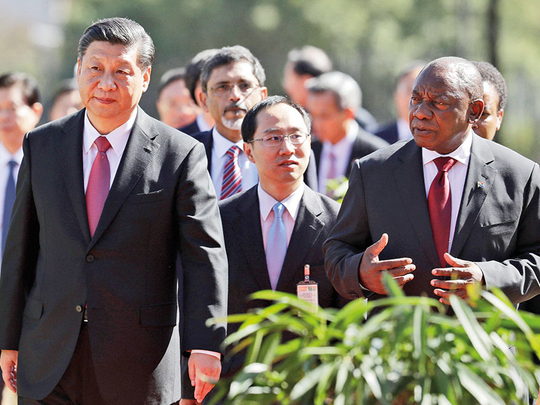
Johannesburg: Chinese President Xi Jinping said a global trade war should be rejected as it would leave no winner, calling on the Brics nations to reject unilateralism in the wake of tariff threats by US President Donald Trump.
“We should be resolute in rejecting unilateralism,” Xi said yesterday at the opening ceremony of the summit in Johannesburg between Brazil, Russia, India, China and South Africa.
Earlier, South Africa’s trade minister warned the summit that the world’s trading system is enduring “enormous turbulence.” Rob Davies referred to economic worries related to US tariffs on goods from major trading partners and retaliatory action from those countries, calling it “a moment of crisis for the global multilateral trading system.”
- A diplomat involved in drafting the summit’s final statement
Russian President Vladimir Putin, Indian Prime Minister Nardendra Modi and other leaders are scheduled to join Xi Jinping for the three-day summit that started yesterday in Johannesburg. Ahead of his arrival in South Africa, Modi was in Uganda, where he pledged to deepen India’s engagement with Africa.
As Trump’s tariff salvos threaten global trade wars, leaders from the Brics bloc are expected to band together in defence of the multilateralism the US once championed. The Brics summit is their first since the Trump administration launched a push to rebalance trade relationships that the US President has deemed unfair.
From threatening to tear up existing trade deals to hiking steel and aluminium tariffs, the US move towards unilateral action has rattled traditional allies and rivals alike. And Brics nations have been on the frontline of the global tensions.
Common interests
Last week, Trump said he was ready to impose tariffs on all $500 billion (Dh1.84 trillion) of imported goods from rival economic superpower China. But even South Africa, a tiny exporter of steel, aluminium and automobiles to the US, is facing barriers. “If you don’t have an agreed rules-based trade system then it’s a matter of power. And unilateralism is not something you want to contemplate,” Davies said.
Brics’ dominant member China has stressed the need to fight protectionism and promote multilateral global trade. “We are against unilateralism — we are in favour of free trade,” Chinese Premier Li Keqiang said earlier this month in response to Trump’s trade moves.
From its origin as an acronym coined in 2001 by then-Goldman Sachs chairman Jim O’Neill, Brics has struggled to take shape as a body voicing cohesive positions on politics and forging deeper trade ties.
Its collective gross domestic product grew more than six-fold from $2.7 trillion in 2000 to over $17 trillion last year, eclipsing that of the European Union. However, the value of trade between its members has actually fallen nearly nine per cent to $312 billion over the past five years, according to Johannesburg-based Standard Bank.
Analysts say global trade turmoil could give the group a shot in the arm. “Brics knew what they weren’t, ie Western, — without quite knowing what they were,” said Martyn Davies, Deloitte Managing Director for emerging markets and Africa. “Now with the Trump administration, suddenly there’s an emerging common interest, ironically around trade.”
Though they will not condemn the US, Brics leaders will staunchly defend multilateralism and organisations including the World Trade Organisation, according to a diplomat involved in drafting the summit’s final statement. “The language of the statement will not be standard language because we live in special times,” the diplomat said.
A push to foster trade flows between Brics member states is also expected, officials and analysts said. Those efforts include bolstering the New Development Bank, the grouping’s financial institution.
— Reuters & AFP
What is Brics?
■ Brics is made up of China, Brazil, Russia, India and South Africa, and are all members of the G20.
■ The first Bric Foreign Ministers’ Meeting was held in 2006 between China, Brazil, Russia and India on the margins of the 61st session of the UN General Assembly, which drew the prelude for Bric cooperation.
■ The acronym Bric was coined in 2001 by then-Goldman Sachs chairman Jim O’Neill.
■ In 2009, the first Bric Summit was held in Yekaterinburg, Russia. Since then, the summit has become an annual event.
■ In December 2010, China invited South Africa to join Bric and attend the Summit in Sanya. Bric officially enlarged to include five countries and the acronym changed into Brics.
■ Together, Brics countries account for 26.46% of world land area, 42.58% of world population, 13.24% of World Bank voting power and 14.91% of IMF quota shares.
■ According to IMF’s estimates, Brics countries have contributed more than 50% of world economic growth during the last 10 years
■ The summit in Johannesburg this year of presidents from the trade bloc is the first since the US launched a push to rebalance trade multilateralism that Donald Trump has deemed unfair, relationships which the US once championed.
— Compiled from agencies












